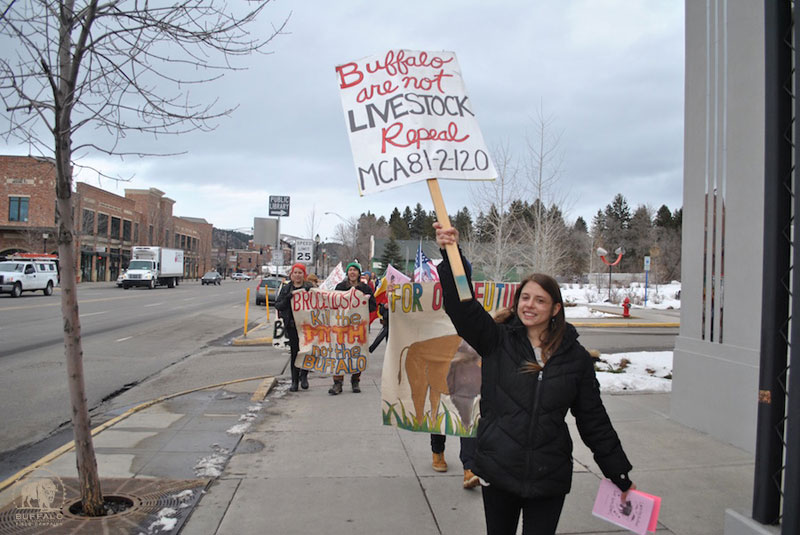
by Deep Green Resistance News Service | Feb 13, 2018 | Protests & Symbolic Acts
by Buffalo Field Campaign
Mark your calendars and plan to join Buffalo Field Campaign for some winter rallies for wild buffalo!
Yellowstone, Montana, and other bison managers have aims to kill upwards of 900 of the gentle giants this winter, all to appease Montana’s infamous livestock industry. The country’s last wild buffalo — a sacred and keystone species who is our National Mammal — are in dire straights and we must rally together to demand that they are protected and allowed to flourish, not be slaughtered to satisfy the whims of the cattle industry.
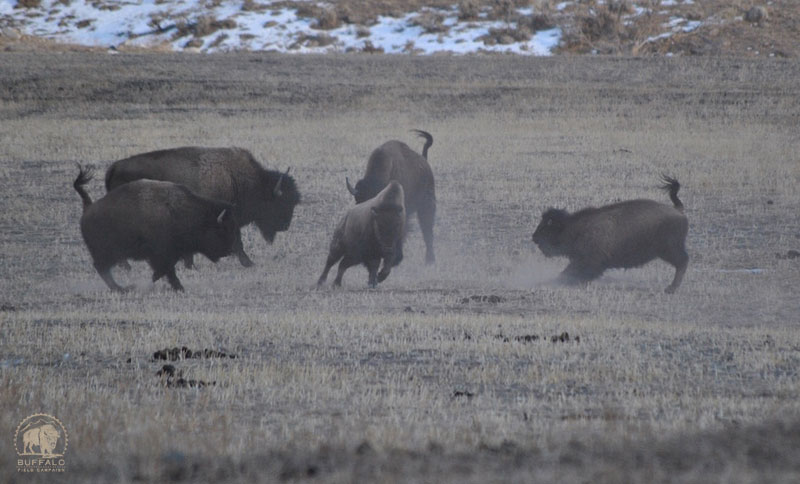
BFC Week of Action!
February 12 – 18, 2018
Join us for a series of gatherings, events, and rallies that we have planned for various towns near Yellowstone National Park. Dates, locations, and details are as follows:
Feb. 12, Monday, BFC Headquarters, West Yellowstone, MT
Kick off the week at camp with a meet-and-greet, orientation, and feast before we begin the week’s events.
Feb. 13, Tuesday, Gardiner, MT. First Annual Rosalie Little Thunder Memorial Walk
At 1:30 pm, gather at the Gallatin National Forest Gardiner Ranger District Office, 805 Scott St W, Gardiner, MT. We will begin our walk at 2:00 pm. We will walk through the town of Gardinger, past the Roosevelt Arch, and down Old Yellowstone Trail through Yellowstone National Park, The walk will end around 5:30, at the Beattie Gulch Trailhead, where we will share a meal and then hold a candlelight vigil in solidarity with wild buffalo and all of their advocates.
Feb. 14, Wednesday, Bozeman, MT. Rally Through Downtown
We will have an information table at the Bozeman Library, 626 E Main St, Bozeman, MT, from 11:00 a.m. – 4:00 p.m. We will gather banners, signs, and puppets, and march up and down Main Street throughout the day. Lunch and snacks will be provided.
Feb. 15, Thursday, BFC Headquarters. National Call-in Day and Day in the Field
A day of rest, direct action trainings, and field orientations for folks at camp. Everyone around the country and the globe will chime in and make Yellowstone’s and Montana’s phones ring off the hook as we hold our National Call-in Day. Targets and contact information will be forthcoming.
Feb. 16, Friday, Helena, MT. Rally at the State Capitol
Meet on the steps of the state capitol building, 1301 East Sixth Avenue, from 12:00 p.m. – 3:00 p.m. for a rally. We will have speakers from various Tribes, BFC, and other organizations to share their inspiration about wild buffalo. We anticipate drumming, singing, and story-telling. Possibly a visit to Governor Bullock’s office. Folks are also welcome to visit the office of the Montana Department of Livestock to share your feelings with them. A hot meal will be provided after the event. More details regarding speakers, etc., will be shared as available.
Feb. 17, Saturday, West Yellowstone, MT. Rally Through West Yellowstone
Meet at BFC Headquarters by 8:00 am for breakfast, or by 11:30 to carpool to town, or meet at Buffalo Spirit at 12:00, 14 N Canyon St, West Yellowstone, MT. From noon until 3:00 p.m., we’ll break out the banners, signs, drums, and puppets and march through the town of West Yellowstone, which is the most visited entrance to Yellowstone National Park.
Feb. 18, Sunday, BFC Headquarters. Gathering, Feasting, Trainings, and Story-Sharing
Enjoy a day in the field with the buffalo, learn from experienced activists, relish a delicious dinner, then share the stories and songs from your culture or your experiences, and learn from others. This close-down to our Week of Action is a bonding time that strengthens our solidarity as we move forward to defend the Earth from wherever we roam.
More information will be provided as we build these events. Please RSVP with our volunteer coordinators at volunteer@buffalofieldcampaign.org or call 406-646-0070. Bring friends, bring creative energy, bring your love for the wild!
by Deep Green Resistance News Service | Nov 28, 2017 | Lobbying, Protests & Symbolic Acts
Editor’s note: The first Rights of Nature lawsuit in the United States, Colorado River v. Colorado, was filed September 25, 2017, in Denver, Colorado. The full text of the complaint can be found here.
by Deep Green Resistance Southwest Coalition
Denver, CO – The Colorado Attorney General has threatened the attorney who filed the first federal rights of nature lawsuit with sanctions if he does not voluntarily withdraw the Complaint.
Rights of Nature activists will gather at dusk (4:30 pm) on Friday, December 1st, outside the Alfred A. Arraj Federal Courthouse, 901 19th St, Denver, CO 80294 in a display of creative resistance. They will demand that the Colorado River have her day in court, condemn the Attorney General’s intimidatory tactics, and call for the American legal system to grant the Colorado River Ecosystem the same rights as corporations.
Attorney Jason Flores-Williams, in a letter he sent to the Colorado Attorney General’s office Tuesday morning, November 27th, stated, “The Attorney General’s threat of sanctions is a legally baseless attempt to harass and intimidate a civil rights attorney in good standing who has dedicated his career to protecting the powerless from the powerful.” A copy of the letter is published here.
“They didn’t threaten to sanction Exxon attorneys for lying about global warming, or Bank of America attorneys for fraudulently foreclosing on people’s homes, or Nestle attorneys for privatizing our water and selling it back to us—but try to equal the playing field between corporations and the environment and they try to personally damage you,” Flores-Williams has also pointed out. “It’s the playbook.”
Will Falk, a writer, attorney, and one of the next friends in the lawsuit, denounced the Attorney General’s threats, saying, “The Attorney General is duty-bound to work solely for the good of the people, but through these threats the Attorney General is working solely for the good of corporations.”
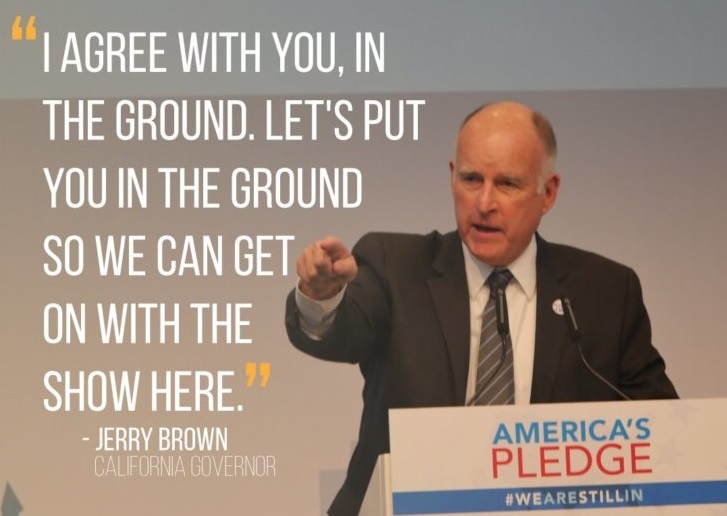
by Deep Green Resistance News Service | Nov 14, 2017 | Protests & Symbolic Acts
by Dan Bacher / Intercontinental Cry
Governor Jerry Brown doesn’t always deal with critics of his controversial environmental policies well — and that was the case again on Saturday, November 11, when he spoke at the UN Climate Conference in Bonn, Germany. Californians, including indigenous water protectors and those on the frontlines of climate change, disrupted California Governor Jerry Brown’s speech at the “American’s Pledge” event at the UN climate talks to confront his strong support of fossil fuels in his state.
The banner-carrying protesters yelled, “Keep it in the ground” and other chants, referring to the governor’s strong support of fracking, both offshore and on land in California, and cap-and-trade policies that could prove catastrophic to the Huni Kui People of Acre, Brazil and other indigenous communities around the globe.
“I wish we have could have no pollution, but we have to have our automobiles,” said Brown as the activists began disrupting his talk.
“In the ground, I agree with you,” Brown said. “In the ground. Let’s put you in the ground so we can get on with the show here.”
“This is very California. Thanks for bringing the diversity of dissent here,” the visibly disturbed Brown continued.
This is not the first time that Brown has employed harsh words to blast his opponents. On July 25 of this year, Brown blasted critics of his oil industry-written cap-and-trade bill, AB 398, for practicing “forms of political terrorism that are conspiring to undermine the American system of governance” in an interview with David Greene of NPR (National Public Radio).
Governor Brown, portrayed as “a green governor,” “climate hero,” and “resistance to Trump” by the mainstream media and corporate “environmental” NGOs, has come to the climate talks to promote California as a global model of “climate leadership” at a time when increasing number of Californians are fed up with his pro-Big Oil and pro-Big Ag environmental policies.
“When cities and states combine together and then join with powerful corporations, that’s how we get stuff done,” said Governor Brown at Saturday’s event at the U.S. Climate Action Pavilion, the exhibition space sponsored by U.S. non-federal leaders at COP23. “We’re here, we’re in and we’re not going away.”
However, Indigenous Peoples, frontline communities, environmentalists and climate activists disagreed strongly with Brown’s contention that cities and states collaborating with “powerful corporations” is “how we get stuff done” – and held this non-violent direct action to expose Brown’s deep ties to Big Oil and ‘false solutions” such as carbon markets.
“From refusing to ban fracking to letting oil companies dump toxic waste into underground water supplies, Governor Brown promotes policies that incentivize oil and gas production in the state,” according to a news release from the Indigenous Environmental Network. “His cap-and-trade extension includes provisions written by oil lobbyists that prevent state and local agencies from directly limiting carbon emissions from oil refineries. He has also failed to shut down the Aliso Canyon natural gas storage facility, where the largest methane leak in U.S. history forced thousands to flee their homes in 2015.”
On November 9, a Center for Biological Diversity report released at the Bonn conference revealed that three-quarters of California’s oil is as “climate-damaging” as Canadian tar sands crude. “Oil Stain: How Dirty Crude Undercuts California’s Climate Progress” found that eight of the state’s 10 largest-producing oil fields produce “very dirty crude with greenhouse gas emissions comparable to tar sands oil,” according to the Center. The report detailed how “the state’s dirty oil problem is compounded by policies that incentivize crude production.”
The groups called on Governor Brown to ban new drilling and fracking, phase out fossil fuel production, and commit to “a just transition to clean energy for all.”
“Northern California has five refineries stretching along our Bay on the North East side of San Francisco,” said Daniel Ilario, Idle No More SF/Bay Area. “Those living along this Refinery Corridor experience continuous negative health effects such as respiratory problems, birth defects, leukemia and cancers. California’s answer to our global climate crisis, the Cap and Trade extension (AB 398), will continue allowing refineries to expand, pollute, and ultimately destroy life.”
“The Phillips 66 Refinery in Rodeo, CA plans to expand their marine terminal to increase crude oil imports by water from 30,000 barrels a day to 130,000 barrels a day. We will not let this happen. Decision makers around the world need to understand that Governors Jerry Brown’s carbon market scheme will continue killing our people and poisoning our water, air, and soil. We will not accept the false solution of carbon trading that increase pollution in our hometowns while violating indigenous rights and human rights around the world. We must keep fossil fuels in the ground,” said Ilario.
Ninawa Nuneshuni Kui, President of the Huni Kui People of Acre, Brazil, said Brown’s “American Pledge,” based on environmentally unjust carbon trading, would lead to the displacement of his people and the destruction of his land.
“I wanted to leave a message here, for humanity and all of planet, that the peoples need to join to defend Mother Nature, the soil, water and air because they are being threatened,” said Ninawa Nuneshuni Kui, President of the Huni Kui People of Acre, Brazil. “And humanity needs Nature to survive. So I want to say that Nature and the air are not a means of commerce for anyone and it’s every human’s right to live in peace. Jerry Brown’s ‘American Pledge’ will lead to the displacement of my people and the destruction of my territory. We need to respect the rights of Nature and humans beings that need her to survive.”
Eva Malis, a young person from Valencia, CA, pointed out that Californians have been asking Governor Brown for years to step up and “be a true climate leader.”
“If he is going to be celebrated by the world as a climate leader, he needs to commit to the communities on the frontlines of fossil fuel extraction. Real climate leaders don’t frack. This isn’t just about Californians. The world needs Jerry Brown to do more in his own state,” said Malis.
“California Governor Jerry Brown is one of the biggest liars when it comes to being a ‘climate leader,’” summed up Isabelle Zizi of Idle No More SF Bay. “In 2014, hundreds of our drinking water and agricultural aquifers were contaminated with 3 billion gallons of fracking wastewater. The cap and trade bill that he passed in the summer of 2017 is in favor of more greenhouse gas emissions, more offsets for the fossil fuel industry, and is a false solution to stop climate change.”
Zizi is in Bonn for the UN Climate Talks. Follow her for updates on actions from the #ItTakesRoots delegation of Indigenous people, frontline communities and people of color.
While Brown portrays himself as a “climate leader,” he has in fact received over $9.8 million in contributions from oil, gas and utility companies, often within days of winning big political favors, according to Consumer Watchdog’s “Brown’s Dirty Hands” report released in August 2016.
“The timing of energy industry donations around important legislation and key pro-industry amendments, as well as key regulatory decisions in which Brown personally intervened, raises troubling questions about whether quid pro quos are routine for this administration,” said consumer advocate Liza Tucker, report author. “While Brown paints himself as a foe of fossil fuels, his Administration promoted reckless oil drilling, burning dirty natural gas to make electricity, and used old hands from industry and government, placed in key regulatory positions, to protect the fossil fuel-reliant energy industry.”
The report claims that twenty-six energy companies including the state’s three major investor-owned utilities, Occidental, Chevron, and NRG—all with business before the state—donated $9.8 million to Jerry Brown’s campaigns, causes, and initiatives, and to the California Democratic Party since he ran for Governor.
Then on February 6 of this year, twelve public interest groups, led by Consumer Watchdog and Food & Water Watch, unveiled a comprehensive “report card” on Jerry Brown Administration’s environmental record showing he falls short in six out of seven key areas, including oil drilling, fossil fuel generated electricity, toxic emissions, the California Environmental Quality Act, coastal protection and water.
The report calls for a moratorium on the building of natural gas powered electricity plants, given what they described as “the glut of electric capacity,” and calls for an outside audit of the state’s energy needs. The groups showed how California can improve its environmental protections to meet standards set in other states. The document also urged Brown to abandon his Delta Tunnels project, a plan to construct two massive tunnels under the Sacramento-San Joaquin River Delta, and to make water conservation a priority.
While Brown portrays himself as the “resistance” to President Trump’s positions on climate change and other issues, it is worth noting that Brown and the Trump administration appear to share a lot of common ground on many issues, including water infrastructure, public lands, the Delta Tunnels and the expansion of fracking in California. On April 13, Brown and Secretary of Interior Ryan Zinke had a “positive and productive” meeting during the Secretary’s visit to California, according to Zinke.
by Deep Green Resistance News Service | Oct 12, 2017 | Protests & Symbolic Acts
by Deep Green Resistance Southwest Coalition
The Rights of Nature movement has arrived in the United States! On September 25, Deep Green Resistance, with noted civil rights attorney Jason Flores-Williams, filed a first-in-the-nation lawsuit – Colorado River v. Colorado – seeking personhood for the Colorado River and recognition of the river’s rights to exist, flourish, regenerate, and naturally evolve in the United States District Court, District of Denver. While courts in India, New Zealand, and Ecuador have granted rights to ecosytems, this lawsuit represents the first Rights of Nature action ever brought before a federal court. If the case succeeds, the natural world will gain a powerful new tool in the struggle to stop corporate exploitation.
We invite everyone who loves the Colorado River and the natural world who gives us life to pack the courthouse with us. We want to send a strong message to the judge, the State of Colorado, and the nation that it’s time the American legal system honor the Rights of Nature. The first hearing in the case has been scheduled for Tuesday, November 14 at 10 AM (mountain):
Magistrate Judge Nina Y. Wang
Byron G. Rogers Courthouse C253
1929 Stout Street
Denver, CO 80294
This moment presents an opportunity to change the future of American environmental law while securing a foothold for the Rights of Nature movement in this country. Please join us in Denver to defend the Colorado River.
Find the Facebook event here.
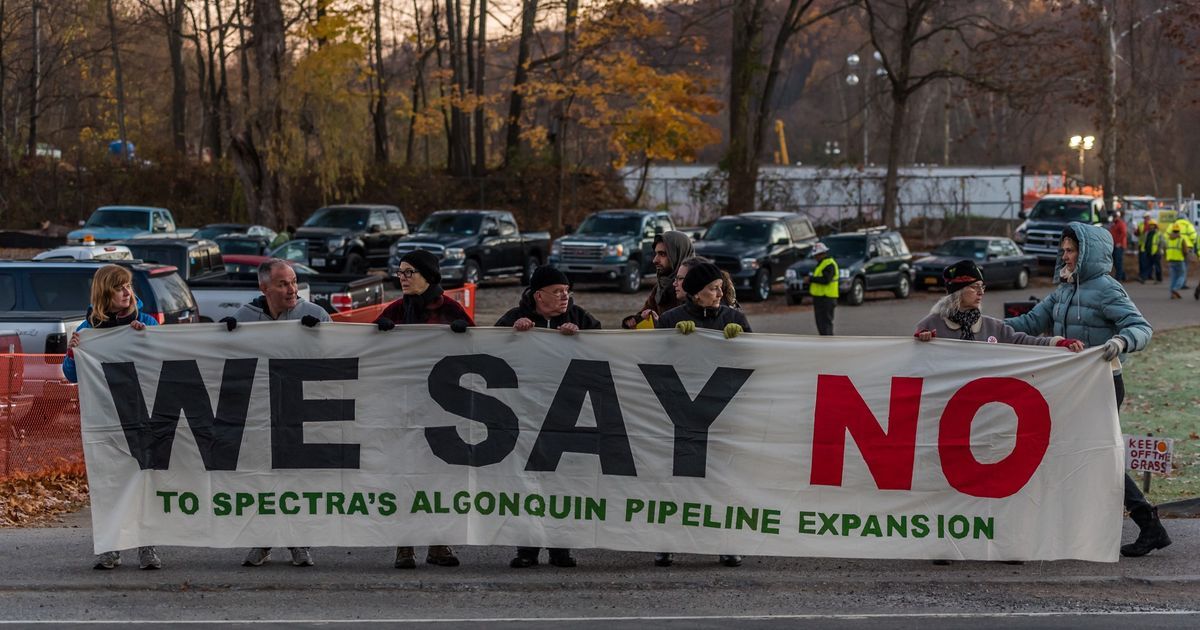
by Deep Green Resistance News Service | Jul 3, 2017 | Lobbying, Protests & Symbolic Acts
by Michael Bucci / Deep Green Resistance New York
Honorable Daniel F. McCarthy, Town Justice
Town of Cortlandt Justice Court
One Heady Street, Cortlandt Manor, New York 10567
Re: Order to Appear at Violation of Conditional Discharge Hearing-June 29, 2017, Docket # 15110186
Dear Judge McCarthy,
Thank you for the opportunity to present our necessity defense during our trial and to explain why we were, on that chilly morning in November, 2015, blockading the construction of Spectra Energy’s Algonquin Incremental Market Project pipeline that runs 400 feet from elementary schools and homes, and 105 feet from critical safety infrastructure at the failed Indian Point nuclear power plant on the Hudson River in Westchester County, NY.
I accept full responsibility for my action. We were all prepared for jail-time. I do realize that the sentence you imposed on us is an attempt to keep us out of jail. And I appreciate that.
I cannot, however, comply with certain provisions of your sentence which includes a 12-month conditional discharge, community service requirements, and fines/fees of $350.00. I cannot comply because the sentence imposed on us Montrose 9 resisters, who oppose the construction of this 42 inch, high-pressure, fracked methane-gas pipeline in our community, is actually a form of punishment meant to keep activists like us fearful, quiet and acquiescent. The sentence seems very harsh to me, especially as an alternative to incarceration, and for just a violation: a non-criminal infraction virtually equivalent to a traffic ticket! The sentence imposed is an attempt to break our will and bully us into submission.
In all honesty, I cannot abide by your conditional discharge requirement not to be arrested over the next year fighting this pipeline. This is a form of judicial repression meant to keep us from freely exercising our first amendment, constitutional rights to protest and resist, in this case, the much greater harm that fossil fuels and greenhouse gasses are wreaking on communities. Our necessity defense at trial, in a very real way, coupled with the dire environmental crises we face and injustices worldwide, require us to continue our resistance efforts in an even more concerted way — disrupting the fossil fuel industry, and perhaps breaking the law whenever necessary, to prevent or diminish the much greater harms of global heating, climate catastrophe and eventual systemic environmental collapse.
I cannot agree to not fighting for justice, alongside my friends, for fear of being arrested when so many injustices must be made right, especially these days, when we need to act powerfully and intelligently to dismantle entrenched systems of oppression. We will even need to directly break some unjust laws, like the unconstitutional and mean Muslim ban, for example. Given the enormous environmental harm being done to our living planet, and the efforts to divide us from one another, we will need to be smarter and even more militant, not less so, in keeping the powerful from harming humans and the living planet, while we build diverse and strong communities of love, support and resistance, like we are doing.
Moreover, we did no harm to the community. In fact, we alerted the community to impending crises. Requiring us to perform community service for fighting on behalf of our neighbors, for trying to protect our community, the water and the land base, from devastation and degradation, I consider wrong-headed and almost insulting, given the way I have tried to live my life in service to the betterment of our communities. (Please see details of my work and “community service” activities, attached.) *
You know that I also disagree with your verdict of guilty both on the merits of the case and with respect to our necessity defense. Regarding who was responsible for the traffic blockage on Route 9A, I do not think that the prosecution actually proved their case, that we were the cause of the traffic jam. There was sufficient doubt given the obvious failure of the State Police to control traffic, which would have taken minimal effort on their part. I also believe we proved the elements of our necessity defense. The harm of burning fossil fuels, especially methane, 80 times more harmful than CO2, is overwhelming and imminent, locally and globally. Threatening our community and destroying the environment for profit with impunity is what is wrong. I doubt that a jury would have found us guilty.
Admittedly, the Montrose 9 was not successful in our efforts to stop this segment of Spectra’s pipeline. We now need to stop the next segment, Atlantic Bridge Project, and all pipelines, and end the entire fossil fuel industry (and ultimately industrial capitalism, male domination and institutionalized racism) from destroying lives. I realize that from now on we will need to organize better and become more effective in our resistance to the extraction, storage and burning of fossil fuels, the massive infrastructure build out, as well as climate injustice against the poor, people of color and front-line indigenous peoples around the world.
As you know from our individual testimonies, we tried just about every avenue to stop the pipeline construction. In fact, many of our elected officials even agreed with us, but they were virtually powerless and/or chose not to effectively help us. Moreover, regulators continually ignored the calls of citizens and elected officials for independent health and safety assessments of this massive pipeline expansion project. Clearly, government and laws are on the side of the corporations, the rich and powerful, all of whom prioritize profits over the well-being of citizens. The law and the courts should be protecting communities from the abuses of corporations and government. The completed segment of pipeline we unsuccessfully resisted is a symptom of the failed political & economic system, a failed democracy & collapsing institutions that do not represent the interests of people or life on our planet. Indeed, we all must go way beyond our comfort zones and do everything necessary to make our world safer, to the degree that each of us can.
These days, we need the help of an independent judiciary, and judicial heroes like Constance Baker Motley and Thurgood Marshall, jurists remembered for their understanding of how citizens and communities need special legal protections from longstanding oppressive institutions, and how important it is to safeguard the civil rights of groups who are systematically targeted by oppression, especially when existing law and precedent are not on their side. They took bold, extraordinary steps, and were successful on behalf of the civil and human rights of communities of color, and all communities, against enormous odds.
I am hopeful that we both love this beautiful community on the Hudson River and want to see it thrive, and be a safe and healthy place to live. Yes, we were hoping that you would side with us against Spectra (now Enbridge) Energy and agree that their harm to this community, and destruction of the living environment for profit, would be what is considered unlawful and should be stopped. I am still hopeful that on a deeply human level, we both want the very best for our community.
Therefore, Judge McCarthy, I am asking you for your help in our efforts to stop this pipeline. If I may be so audacious, we really could use your help in this long, hard fight on behalf of our communities. We need your help and assistance from the judicial branch of government for relief, protection and support, especially since some laws may need to be challenged for the greater good to prevent greater harm. Yes, I invite you to consider joining our efforts. Together, we could definitely keep our community safer.
If you cannot yet support us and our efforts, I ask you simply to consider, at least – to think about – what we and the science and the experts have been saying about the dangers of this pipeline, methane gas leakage in our already vulnerable community, the harm of greenhouse gas emissions, and our responsibility to protect our homes and the earth. Please consider this an invitation and an opportunity to continue our year-and-a-half-long conversation about community health and safety and protection from the harms of the fossil fuel industry. While we continue our efforts to stop the construction of this pipeline with our neighbors, and fight to make our community safer, I hope we will continue this important conversation.
I appreciate your respecting my constitutional right to defend myself, & speak on my own behalf, pro se.
Sincerely,
Michael G. Bucci
Deep Green Resistance
Montrose 9 Defendant
* “Community Service” Activities
Catholic Interracial Council, Pittsburgh, PA 1964-66 – volunteer member.
Little Sisters of the Poor (homes for the elderly), Balt., MD & Wash., D.C. 1966-68 – volunteer.
Co-Founder, Storefront Soup Kitchen/Peace Center, Bronx, NY 1970-73, – volunteer.
Resistance activities/organizing to stop the Vietnam war 1969-74.
So Others Might Eat – SOME Soup Kitchen, Wash., DC 1974-75, – volunteer director.
American Red Cross in Greater New York Disaster Relief Services 1975-1977.
Clinton Housing Development Company – community organizer 1978-1981.
Co-Founded Union of City Tenants 1979-83, – volunteer.
Volunteer – New York Women Against Pornography 1984-85.
Co-founder, Men Against Pornography 1985? – volunteer.
Co-founder, New York Men Against Sexism 1989 – volunteer.
Resistance to South African apartheid 1989-1994.
Co-founder, Whites Against Racism Network (WARN) 1990-1993 – volunteer
Bowery Residents Committee – Director of Housing and Development 1981-1997.
ANHD – Affordable Housing Training to 95 under-resourced NYC community groups 2010-17.
American Red Cross in Greater New York Disaster Relief Services 9/11 volunteer.
We Are Seneca Lake – Fossil Fuel Storage Resistance – volunteer 2014-17.
Compressor Free Franklin – volunteer 2014-Present.
Deep Green Resistance – volunteer 2014-Present.
Resist Spectra – volunteer 2015-Present.
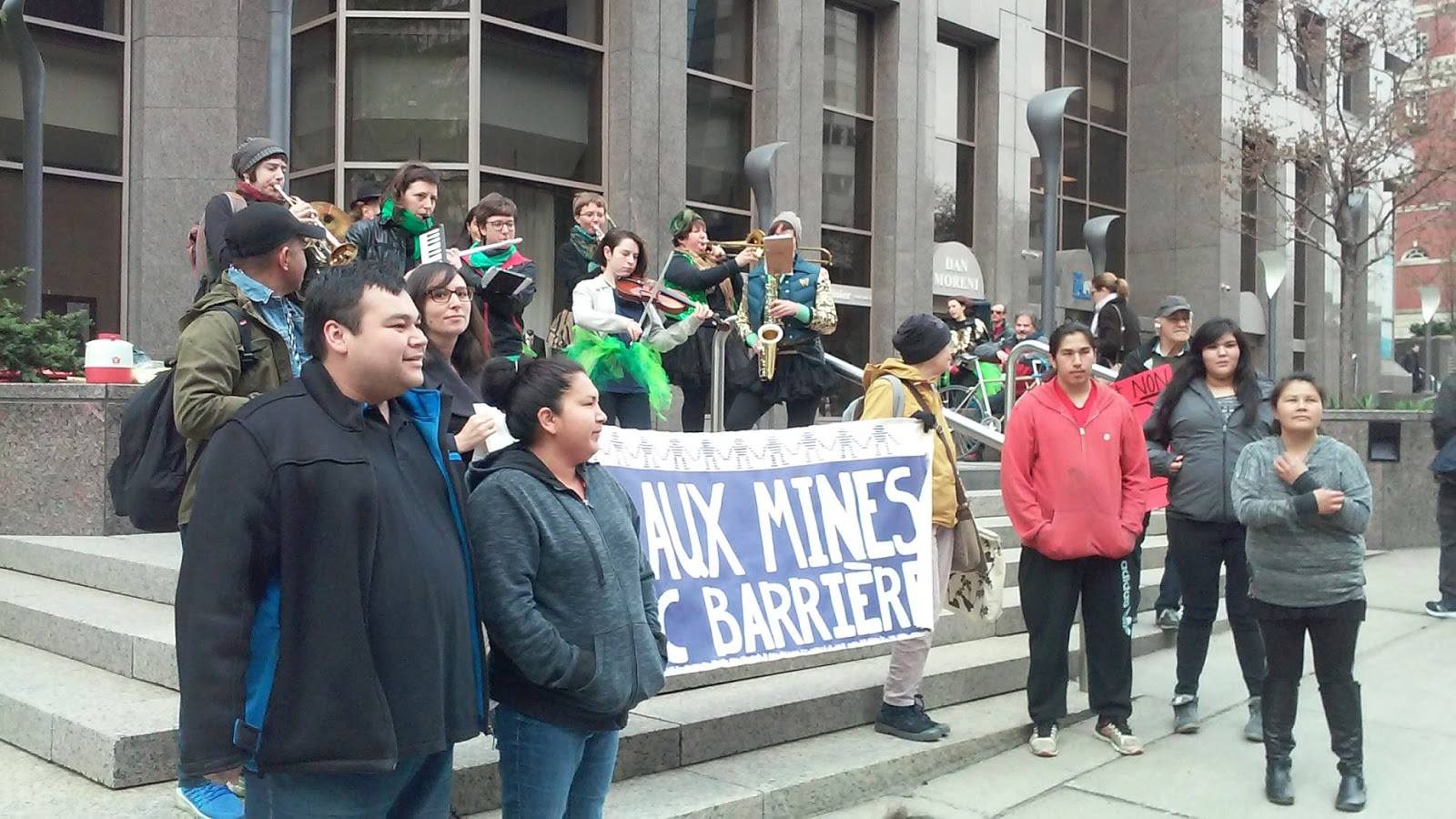
by Deep Green Resistance News Service | May 31, 2017 | Mining & Drilling, Protests & Symbolic Acts
by Barriere Lake Solidarity
When: Thursday, June 1st, 4:15pm
Where: 65 Queen Street West, 8th floor, Toronto
Join us for a flash rally outside of the Annual General Meeting of Copper One – a mining company that has been relentlessly pursuing a claim on Barriere Lake’s land despite firm and repeated refusals by the community.
Community members will be driving to Toronto from Barriere Lake to attend the meeting and tell them there is no possible way they will ever get community consent to drill on Barriere Lake’s unceded Algonquin territory. Just like they’ve been doing since 2011.
The company’s claim covers a large area of the La Vérendrye wildlife reserve and a neighbouring area including the headwaters of the Ottawa River.
In spite of a government decision to suspend the company’s mining claims earlier in 2017, Copper One has repeatedly stated its intention to begin exploratory drilling on the territory of the Algonquins of Barriere Lake.
The Algonquins of Barriere Lake have consistently refused mining exploration on the territory claimed by Copper One. This traditional and current-use territory of the community has been subject to agreements between the community and the governments of Quebec and Canada concerning the joint management of renewable resources, namely the Trilateral Agreement of 1991 and the Bilateral aggreement of 1998. The community has accepted some forms of development on this territory, but has repeatedly stated that mining is not acceptable.
The community objects to the Quebec’s Mining Act’s failure to require consultation with indigenous nations. The Mining Act also fails to allow integrated land use planning in respect of indigenous peoples’ rights and aspirations, including the possibility of saying “no” to mining claims located in culturally or ecologically sensitive areas.





